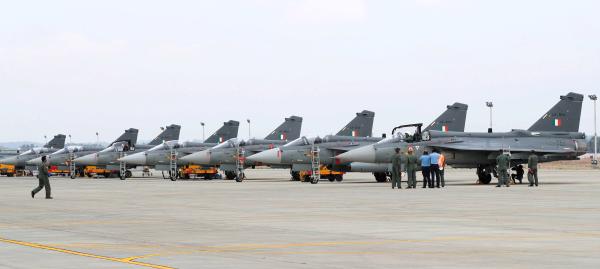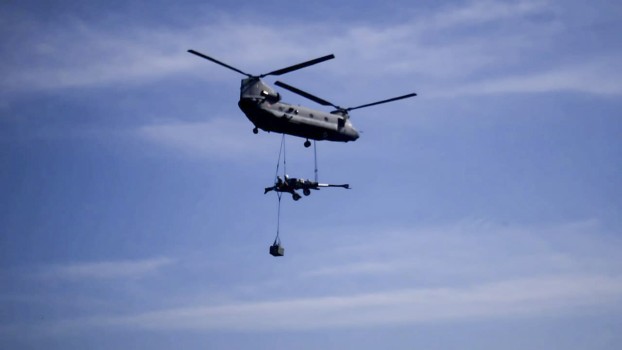NEW DELHI (PTI): Chief of Defence Staff Gen Bipin Rawat and IAF chief Air Chief Marshal RKS Bhadauria on Monday carried out a comprehensive review of deployment of India's ground forces and air assets in high-altitude locations in eastern Ladakh amid the eight-month-long border standoff with China in the region, officials said.
ACM Bhadauria visited the strategically located Daulat Beg Oldie(DBO), Thoise and Nyoma advanced landing strips in Ladakh and took stock of the Indian Air Force's(IAF) readiness to deal with any eventualities in the region, they said.
The DBO Advanced Landing Ground (ALG) is located close to the Line of Actual Control(LAC) at an altitude of 16,700 feet and is known to be the highest airfield in the world. Temperatures in DBO drop upto minus 40 degree Celsius during the harsh winter months. The Nyoma air field is located at a height of around 13,000 feet.
The Chief of Air Staff interacted with the field commanders and was briefed on the operational readiness as well as the status of deployment of the IAF at the high-altitude air bases, officials said.
"During his visit to Thoise, he reviewed the ongoing logistic operations for support and sustenance of troops in the winter season," the IAF said in a statement, adding the air chief also laid a wreath in honour of the fallen heroes at the DBO base.
Separately, Chief of Defence Staff(CDS) Gen Rawat during a visit to Ladakh reviewed the overall security scenario and the country's military preparedness with the ground commanders at the Leh-based 14 Corps, popularly known as Fire and Fury Corps, officials said.
Gen Rawat was given a detailed overview of India's deployment in the region by Lt Gen PGK Menon, the commander of the 14 Corps.
Later, ACM Bhadauria joined Gen Rawat for a comprehensive discussion on operational matters with senior IAF and Indian Army Commanders at the Leh air force station.
Meanwhile, people familiar with the troop movement of the Chinese People's Liberation Army(PLA) in the region said it has withdrawn some soldiers from its training facilities located in depth areas in the region due to the harsh winter, adding it does not have any impact on their operational deployment in any of the areas along the LAC.
About ACM Bhadauria's interaction with the troops on the ground, the IAF said: "The Chief of Air Staff conveyed his deep appreciation for the exceptionally high levels of morale and dedication with which all personnel continue to maintain operational preparedness despite the harsh weather and an inhospitable terrain."
The Army and the IAF have been maintaining a high state of operational readiness along the nearly 3,500-km Line of Actual Control (LAC) with China in view of the border standoff in eastern Ladakh.
Nearly 50,000 troops of the Indian Army are deployed in various locations in eastern Ladakh as multiple rounds of military and diplomatic talks between the two sides have not yielded any concrete outcome to resolve the military face-off. China has also deployed an equal number of troops, according to officials.
The eighth and the last round of military talks had taken place on November 6 during which both sides broadly discussed disengagement of troops from specific friction points.
The CDS has been part of the top military brass framing strategies to enhance India's military prowess in view of the Ladakh standoff.
Last month, Army Chief Gen MM Naravane had visited eastern Ladakh to review the ground situation in the region that has also been experiencing harsh winter.
The border face-off erupted on May 5 last year following violent clashes between the armies of India and China in the Pangong lake area. The incident in Pangong Tso was followed by a similar episode in north Sikkim on May 9.
CDS Gen Rawat and IAF Chief Bhadauria review security scenario in eastern Ladakh amid border standoff with China
Article Posted on : - Jan 12, 2021
Other Related News
India, Chile agree to begin negotiations for trade pact
India and Chile have announced starting negotiations on a comprehensive economic partnership pact as Prime Minister Narendra Modi and Chilean President Gabriel Boric Font held wide-ranging talks focusing on boosting the ties in areas of trade, defence, critical minerals and health.
 Previous Article
Previous Article Next Article
Next Article













The Indian Air Force, in its flight trials evaluation report submitted before the Defence Ministry l..
view articleAn insight into the Medium Multi-Role Combat Aircraft competition...
view articleSky enthusiasts can now spot the International Space Station (ISS) commanded by Indian-American astr..
view article